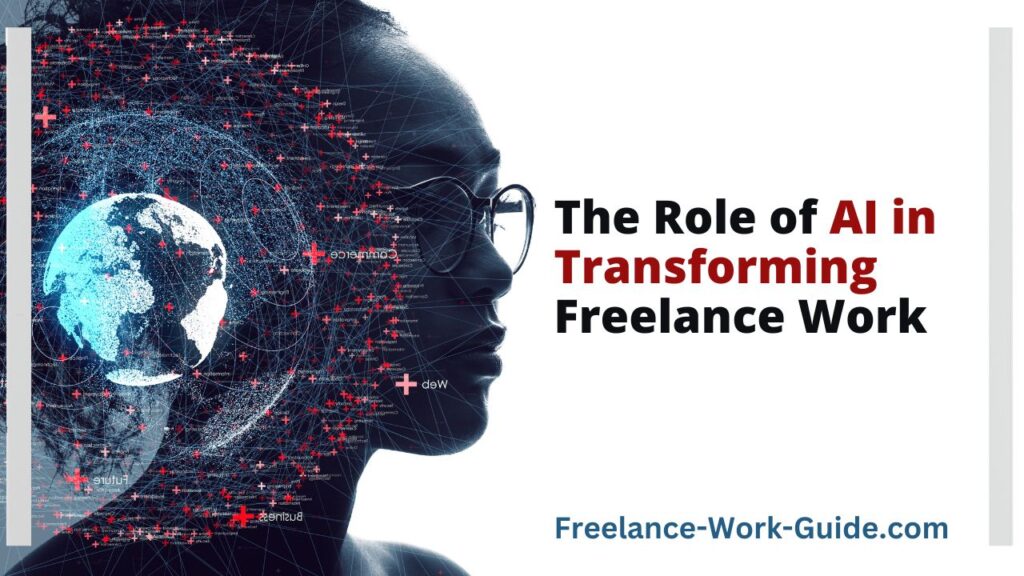Freelance work, also known as self-employment, is becoming increasingly popular in today’s workforce. Freelancers work on a project basis for multiple clients rather than being employed by a single employer. The rise of AI technology, there has been a significant impact on the way freelance work is conducted.
AI has transformed the way work is done, and it has the potential to revolutionize freelance work. This paper will explore the role of AI in transforming freelance work, including its benefits and challenges, the emergence of AI-powered freelance platforms and tools, and predictions for the future of AI in the freelance industry.

The freelance workforce is multiplying and has reached 35% of the global workforce. This growth is being driven, in part, by the increasing use of artificial intelligence (AI) in business. AI is changing the way companies operate and is having a profound impact on the freelance workforce. In this blog post, we will explore the role of AI in transforming freelance work.
The Impact of AI on Freelance Work
AI has significantly impacted freelance work, changing how freelancers interact with clients and complete projects.
One of the benefits of AI in freelance work is its ability to automate repetitive tasks. For example, AI-powered tools can automatically scan and filter job listings, match freelancers with relevant projects, and even provide suggestions for pricing and deadlines. This automation allows freelancers to focus on work and complete tasks more efficiently.
Another benefit of AI in freelance work is its ability to enhance the quality of work. AI-powered tools can provide feedback on the quality of work, identify errors or inconsistencies, and even suggest improvements to the job. This not only improves the quality of work but also saves time for both freelancers and clients.
However, there are also challenges associated with using AI in freelance work. One challenge is the potential for bias in AI algorithms, which can affect the matching process between freelancers and clients. Additionally, some freelancers may need more time to rely on AI-powered tools for fear of losing control over their work or being replaced by automation.
Despite these challenges, the benefits of AI in freelance work outweigh the challenges. With the continued development and implementation of AI technology, the freelance job has the potential to become even more efficient and productive.
AI-Powered Freelance Platforms
AI-powered freelance platforms are emerging as a solution to some of the challenges of traditional freelance work. These platforms use AI technology to match freelancers with relevant projects and clients, manage projects, and track productivity.
1. Freelance Platforms
Examples of AI-powered freelance platforms include Upwork, Freelancer, and Fiverr. These platforms use AI algorithms to analyse job descriptions and freelancer profiles to identify the best match for a particular project. This matching process saves time and effort for both clients and freelancers, allowing them to focus on the work itself.
2. Project Management Tools
AI-powered freelance platforms also offer features such as project management tools that automate administrative tasks, such as scheduling and communication with clients. Additionally, these platforms often include means for tracking productivity, which can help freelancers and clients to manage their time and stay on track with deadlines.
The use of AI in freelance platforms is still in its early stages, but it has the potential to improve the freelance industry significantly. As AI technology improves, these platforms will become even more efficient and effective in matching freelancers with relevant projects, managing projects, and improving productivity.
AI-Powered Tools for Freelancers
As the freelance economy continues to grow, freelancers face unique challenges when it comes to managing their workload and running their businesses. Fortunately, advances in artificial intelligence (AI) technology have developed many powerful tools to help freelancers work more efficiently and effectively.
From writing assistants to virtual assistants and accounting tools to project management software, many AI-powered tools are available to help freelancers optimize their workflows and improve their output. This response will explore some of the most popular and valuable AI-powered tools for freelancers, organized by their primary function or headline.
Here are some AI-powered tools for freelancers, categorized by their headline or primary function:
1. Writing assistance: AI-powered writing assistants can help freelancers write better, more compelling content. Some popular options include Grammarly, ProWritingAid, and Hemingway Editor.
2. Time management: AI-powered tools can help freelancers stay on track and optimize their workflows. Examples include RescueTime, Trello, and Asana.
3. Accounting and invoicing: AI-powered accounting and invoicing tools can help freelancers manage their finances more efficiently. Examples include QuickBooks, FreshBooks, and Xero.
4. Design and creative work: AI-powered design and innovative tools can help freelancers with graphic design, video editing, and audio production tasks. Examples include Canva, Adobe Creative Cloud, and Lumen5.
5. Virtual assistants: AI-powered virtual assistants can help freelancers with various tasks, from scheduling appointments to managing emails. Some popular options include Siri, Alexa, and Google Assistant.
6. Marketing and SEO: AI-powered marketing and SEO tools can help freelancers optimize their content and reach a wider audience. Examples include Google Analytics, SEMrush, and Ahrefs.
7. Project management: AI-powered project management tools can help freelancers keep track of deadlines, assign tasks, and collaborate with clients and team members. Examples include Basecamp, Monday.com, and Wrike.
Overall, AI-powered tools can help freelancers save time, improve their work quality, and streamline their workflows, allowing them to focus on what they do best.
Future of AI in Freelance Work
The future of AI in freelance work is promising, with many potential applications and benefits for freelancers and clients. Here are some of how AI could transform the freelance landscape in the coming years:
1. Enhanced productivity: AI-powered tools can help freelancers automate repetitive tasks and streamline their workflows, allowing them to focus on higher-level work and increase productivity.
2. Improved accuracy: AI algorithms can help freelancers make more accurate predictions and decisions, leading to better outcomes and higher-quality work.
3. Increased efficiency: AI can help freelancers work more efficiently by providing real-time feedback, identifying potential errors, and suggesting improvements.
4. Greater personalization: AI can help freelancers tailor their services to each client’s specific needs and preferences, leading to more personalized and practical work.
5. New opportunities: As AI technology evolves, new freelance roles and opportunities may emerge, such as AI trainers, data annotators, and machine learning engineers.
6. Improved collaboration: AI can facilitate cooperation between freelancers and clients, providing a platform for real-time feedback and communication.
Overall, AI’s future in freelance work will likely bring many benefits and opportunities for both freelancers and clients, enabling a more efficient and personalized approach to freelance work. First, however, ensuring that AI is used ethically and responsibly is vital, with proper consideration given to issues such as bias, privacy, and security.
Conclusion
AI is transforming the way freelance work is conducted, potentially revolutionizing the industry. AI-powered tools and platforms make it easier for freelancers to find relevant projects, manage projects, and improve productivity. In addition, AI is automating repetitive tasks and providing insights to help freelancers make better decisions.
However, challenges associated with using AI in freelance work include potential algorithm biases and concerns about losing control over work. Therefore, freelancers and clients need to understand these challenges and work to mitigate them.
Looking to the future, AI is expected to continue playing a significant role in the freelance industry, with the potential for even more advanced technology and tools. As AI improves, the freelance industry will become even more efficient, productive, and accessible to a broader range of individuals. The role of AI in transforming freelance work is significant and should be embraced by freelancers and clients to improve the overall experience for all involved.
FAQ:
Q1: How can AI help freelancers find more work?
Ans: AI-powered platforms can match freelancers with relevant projects and clients based on their skills and experience. Additionally, AI-powered tools can scan and filter job listings, saving freelancers time searching for new work.
Q2: Can AI completely replace human freelancers?
Ans: While AI can automate specific tasks, it cannot replace human freelancers’ creativity and problem-solving skills. Instead, AI is a tool that can enhance the work of freelancers, only replacing them partially.
Q3: What are some potential biases in AI algorithms used in freelance work?
Ans: AI algorithms can be biased based on race, gender, or geographic location. This can affect the matching process between freelancers and clients, resulting in unfair opportunities for specific groups.
Q4: What are some benefits of using AI-powered project management tools?
Ans: AI-powered project management tools can automate administrative tasks such as scheduling and communication with clients, saving freelancers time and improving productivity. Additionally, these tools can provide insights into project progress, allowing freelancers to make better decisions and optimize their time management.
Q5: How can freelancers ensure their data security when using AI-powered tools and platforms?
Ans: Freelancers should carefully review the privacy policies of AI-powered tools and platforms and ensure that their personal information and work data are protected. Additionally, freelancers can use security measures such as two-factor authentication and strong passwords to protect their accounts.
Related Content
- Jasper AI Helps Freelance Copywriters Produce Quality Content Quickly
- Make AI Content Writing Work for You With Jasper.AI
- Content Ranking Guide- Using Surfer SEO’s and Jasper AI’s Artificial Intelligence
- AI Guest Posting Guide To Using Surfer SEO’s and Jasper AI’s Artificial Intelligence To Increase Your Income
- 15 Freelance Income Opportunities from Ai Content Writing for Our Generation
- College Students Freelancing 101 Guide To Starting Writing With AI
- Canva With Magic Write (Ai) Can Help Your Family Fight Inflation
- How Freelancing And Ai Can Help You Escape From Mortgage Prison
- AI Content Generator: The Freelancer’s Ultimate Guide to AI-Created Content, Graphics and Art
- AI Article Detection: Why You Need to Protect Your Content
- How to Refine Your Freelance Writing Pitch for Publishers in a Time of AI
- How Can AI change Freelancing Careers
- Top 11 AI Video Makers (Text-to-Video) that Are Mostly Free
- Jasper.ai for Non-Native English Speakers: How to Improve Your Writing Skills with AI
- Canva Create 2023 and AI: How AI Integration is Revolutionizing Design
- AI-Proof Your Freelance Career: Boosting Your Skillset with Fiverr Learn and Canva Design School
- How AI and Freelance Game Developers Collaborating is Driving Innovation in the Gaming Industry

Reference: 405 Freelance Statistics for 2023: Market Size, Profile Data & Salary Rates














